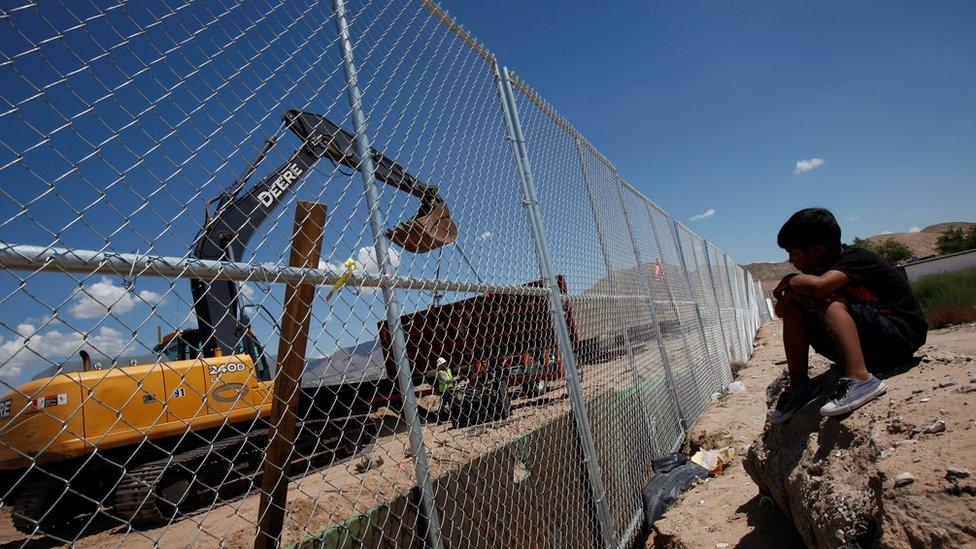Mexico anger ahead of Tillerson visit
- Published
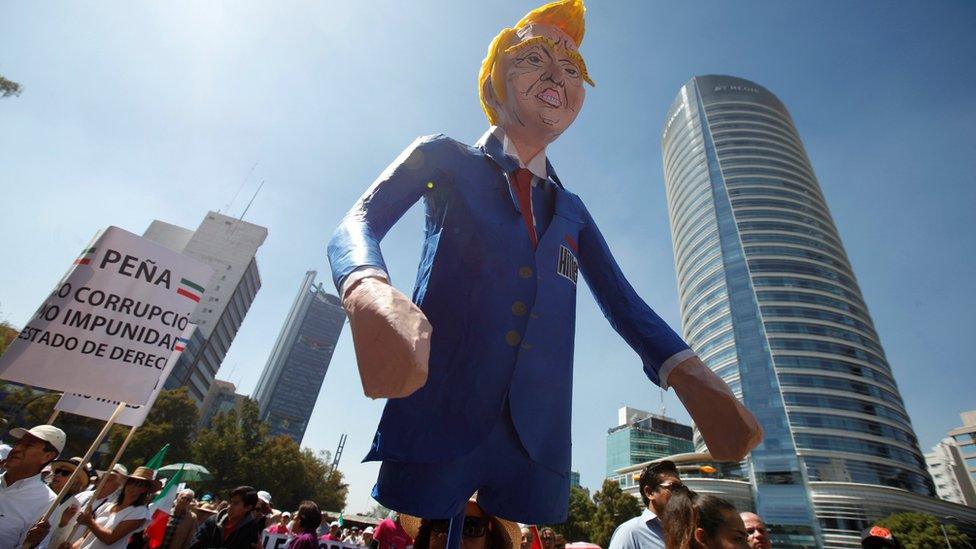
Protesters have called for Mexicans to stand in "unity" against Mr Trump's immigration policies
Three separate political events in as many days last week laid bare the differences over the US-Mexico relationship, as the new US Secretary of State, Rex Tillerson, arrives for his first visit to the country.
The first was the Day Without Immigrants. Held in towns and cities across the United States, it was a timely reminder of the importance of the immigrant community to the US economy.
From Washington DC to Detroit, from LA to New York, restaurants, coffee shops and convenience stores closed their doors as part of a nationwide immigrant-rights solidarity movement.
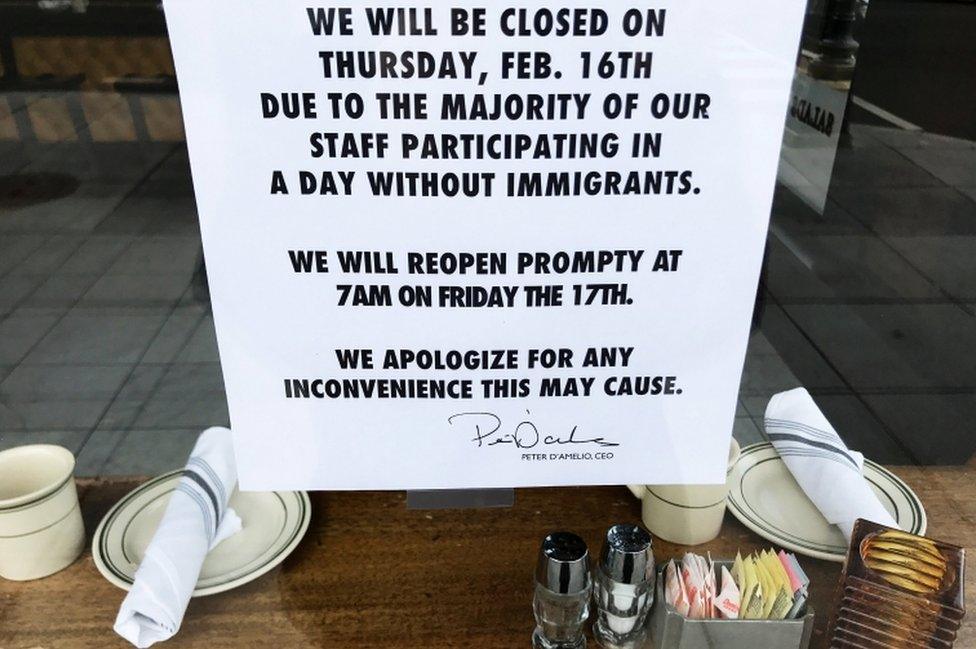
Restaurants were closed in several major cities across the US
It is estimated that about seven million immigrants work in the restaurant industry alone, not to mention sectors such as construction, healthcare, food production and manufacturing.
The participants wanted to send a clear message to the Trump administration about its hard-line stance on deportations and the border wall.
The next significant political event was the following day in an aircraft hangar in Melbourne, Florida.
A rally by President Trump saw him, in effect, back on the campaign stump, making a speech that sounded as though the election was just days away, not recently won.
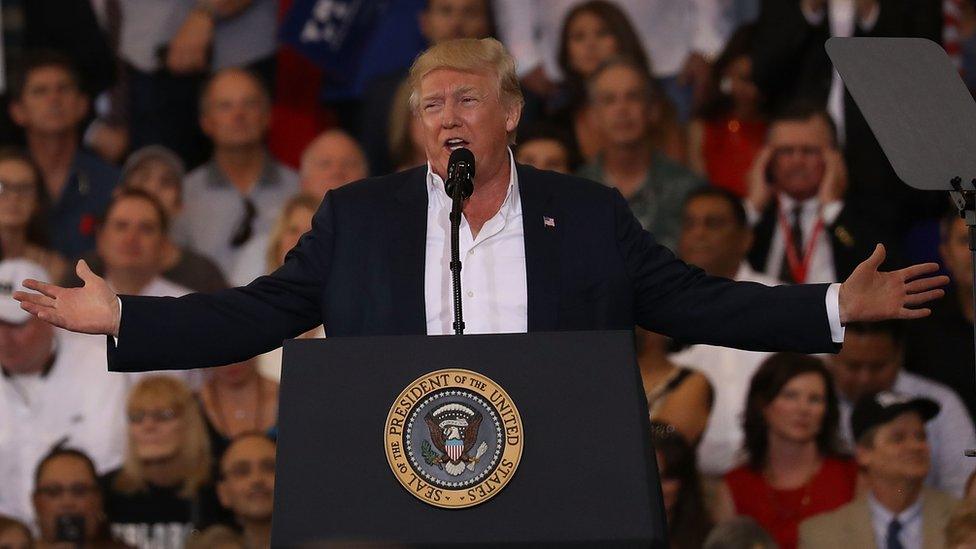
President Trump used his speech in Melbourne to reiterate his plans to deport large numbers of "bad hombres"
In the media storm that followed the president's confusing reference to Sweden, his comments on Mexico were largely lost.
Again he mentioned the "bad hombres" from the southern side of the border, on this occasion explicitly calling them "gang members, bad, bad people".
'Take the shackles off'
His administration, he assured his supporters, would soon be deporting large numbers of undocumented immigrants with criminal records.
"I said [from] day one, they're going out. Or they're being put in prison, but for the most part, get them the hell out of here. Bring them back to where they came from," he said, to huge applause.
This week, that promise has been backed up by tough new guidelines on deportations.
Civil rights groups such as the ACLU fear the move will target immigrants who have spent years living and working in the shadows in the US, and now face being deported over parking violations or minor infractions.
However, the Trump administration says the step will strengthen existing rules and "take the shackles off" the relevant law enforcement agencies.
The final event was in Mexico itself.
On Sunday, tens of thousands took to the streets of the capital, Mexico City, as part of what the organisers called Vibra Mexico.
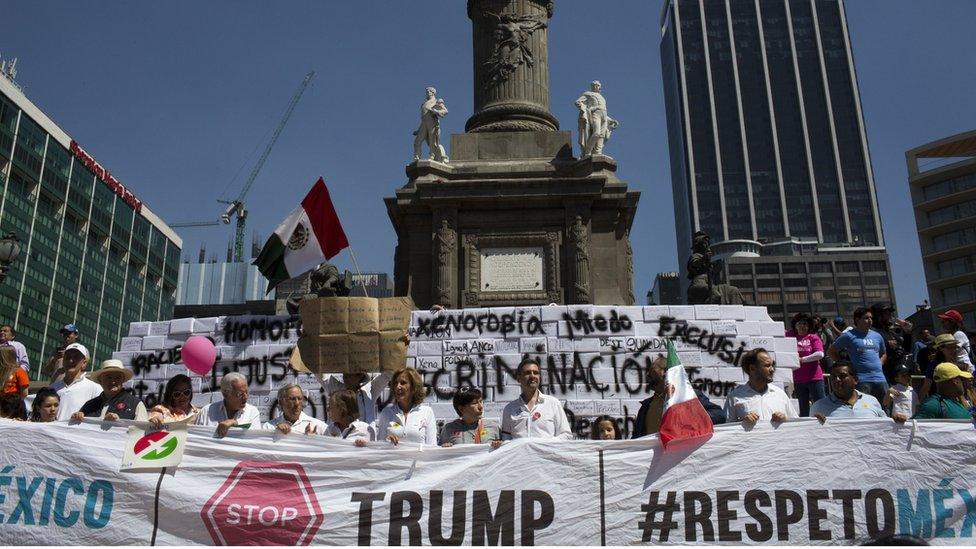
Demonstrators unite in a call for Mr Trump to respect the Mexican people
The placards being held up made it clear against whom the ire in Mexico was directed.
"Stop Trump!" read a huge banner in English, although "Fuera Pena!" - meaning "Pena Out" - was equally prominent.
The Mexican President, Enrique Pena Nieto is facing the lowest approval ratings of any Mexican leader since the 1994 peso crash, which left the Mexican economy on its knees.
His handling of Donald Trump, combined with a controversial fuel price hike known as the "gasolinazo", has infuriated ordinary Mexicans, and for many the end of his controversial presidential term can't come around soon enough.
Besides the anger at the two presidents, the other noticeable feature of Vibra Mexico was the call for national unity in the face of what people here perceive as unfettered aggression by the Trump administration.
"Something amazing that Trump has accomplished, is a sort of 'rally-around-the-flag' phenomenon in Mexico," says Dr Eric Magar, political scientist at the ITAM institute in Mexico City.
'Two-cent government'
Even Mr Pena Nieto experienced a short-lived bump in popularity when he chose not to travel to Washington DC for a bilateral meeting at the White House.
"Pena Nieto, even if he's a very weak leader and indecisive, has been receiving the applause of the Mexican elite," says Dr Magar.
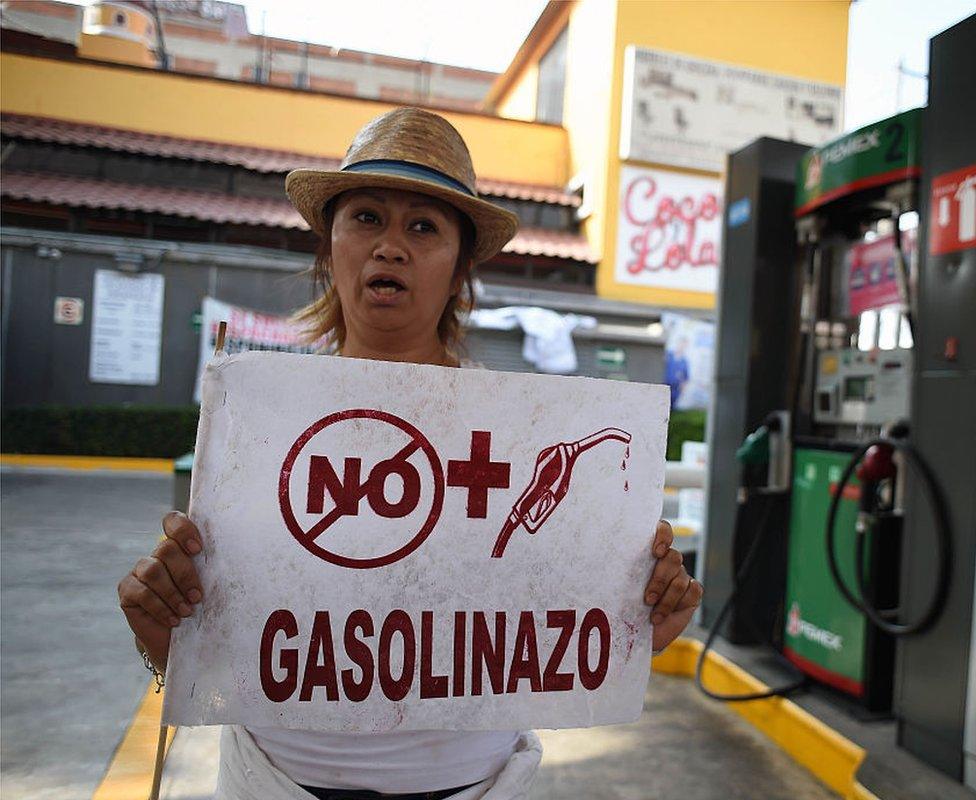
Protestors have criticised the president's handling of the fuel price crisis
Not, though, that of most of the Mexican electorate, who are furious at the clumsy way the government has dealt with the economic crisis.
For example, the Finance Ministry announced last week that the cost of a litre of petrol would go down at the pumps.
Amid the pain of the "gasolinazo", it sounded like welcome news for consumers.
However it didn't take long to realise this wasn't the bold economic gesture many had been calling for.
It was two cents cheaper.
That's not two US cents, but two cents of a Mexican peso - a price reduction so infinitesimally small that many considered it a mockery.
As one political commentator put it: "If it weren't so humiliating, we'd be laughing".
It immediately prompted a new hashtag to appear on social media in Mexico: #GobiernoDeA2Centavos, meaning "Two Cent Government".
Currently, that is about as much as many voters think Mr Pena Nieto's administration is worth.
Add to this economic malaise President Trump's protectionist policies, the detested border wall and his insistence that Mexico will pay for it, plus the insulting tone and very public nature of the debate being conducted via Twitter, and the new US Secretary of State, Rex Tillerson, arrives in Mexico City amid some hostility.
Accompanied by the head of the Department of Homeland Security, John Kelly, the two men have an unenviable task: building bridges where their boss has been building a wall.
How will President Trump deliver on border wall promise?
"The wall is the symbolic part," says Dr Magar, "but the important part is the trade war that is looming. That will hurt us more."
"A huge part of our prosperity is based on trading with the US. Any plan to cut ties with Mexico would hurt us very much. So pain is on its way."
'A true friendship between two societies'
It is against that background that the Mexican flags turned out in force for Vibra Mexico and the handmade signs urging "unidad y dignidad" - unity and dignity - among Mexicans.
For Jesus Silva-Herzog Marquez, renowned Mexican essayist and political commentator, the calls for unity are misguided.
Writing in the national newspaper, Reforma, he called instead for "visible and noisy disunity".
"Diversity doesn't make us vulnerable," he wrote. "We are not facing a military invasion. The challenges we face are very different and can't be faced if we choose to postpone our disagreements."
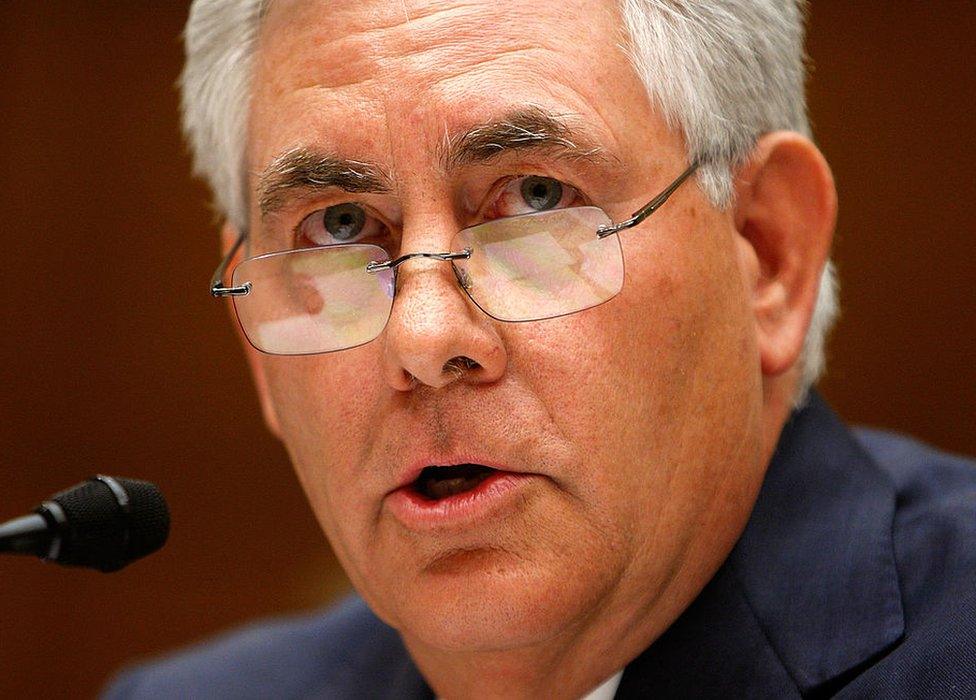
The new US Secretary of State, Rex Tillerson, has no previous diplomatic experience
Many analysts see those challenges in two key areas: migration and trade.
"Both endeavours require the opposite of union: real conflict over the rights and interests," said Mr Silva-Herzog, urging public and open debate in Mexico.
Either way, as the question of renegotiating the Nafta trade agreement looms, Mr Tillerson's Mexican counterpart, Luis Videgaray, made a plea for unity of his own during a trip to the other Nafta member, Canada.
"The true benefit of Nafta is not economic, it's cultural," he said in flawless English at a panel discussion in Toronto.
"Our relationship is fundamentally a true friendship between two societies. We should do more not only to be closer but also to feel closer."
The Trump administration's envoys might also carry a more conciliatory message than their president - but given recent events, they face a tough time delivering it to most Mexicans.
- Published18 February 2017
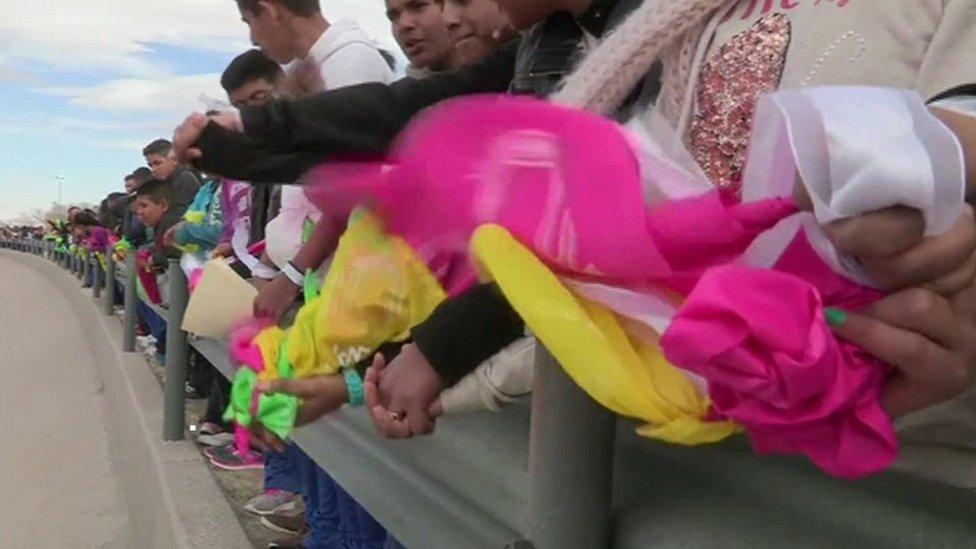
- Published13 February 2017
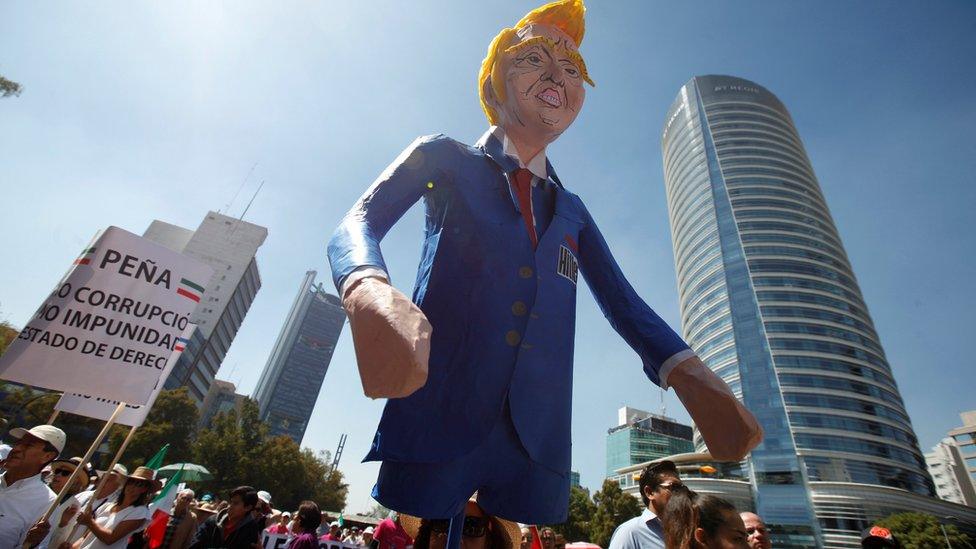
- Published10 February 2017

- Published7 February 2017
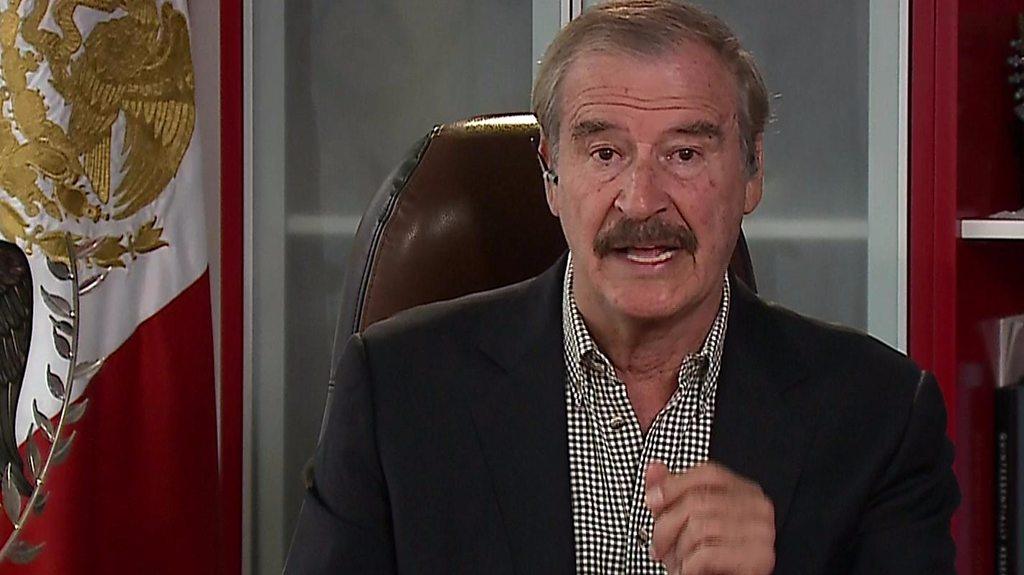
- Published6 February 2017
